researching the future of human and artificial cognition
a philosophy research lab at the university of toronto

news
> Periscope researchers contribute to a new $3.5M grant to examine AI conversational agents effects on human well-being and character development link ⇨> Dr. Miron Clay-Gilmore presents a data visualization exhibition on The Technologization of Counterinsurgency, at the Centre for Ethics on February 10, 2026 link ⇨> Dr. Miron Clay-Gilmore, is hosting a new podcast series, "Algorithms of Empire". link ⇨> Prof. Karina Vold published a new article in Cambridge Forum on AI: Law and Governance, titled "Augmenting Military Decision Making with Artificial Intelligence." link ⇨
> Periscope hosted the 3rd Technophilosophy Soiree on AI companionship this month. The event had a lively conversation and energy, with over 250 people registered. Read about the event here: link ⇨> Dr. Miron Clay-Gilmore has a new article out in AI Ethics: "Hunting for humans: on slavery, the emergence of the US as the world’s first super industrial state and its deployment of artificial intelligence and other military technology to repress dissent and neutralize enemy combatants.link ⇨> CBC News interviews Prof. Vold about the rise of fake AI accounts on facebook link ⇨
members

Dr. Karina Vold is an Assistant Professor at the Institute for the History and Philosophy of Science and Technology at the University of Toronto. She is a Research Lead at the U of T Schwartz Reisman Institute for Technology and Society, an AI2050 Early Career Fellow with the Schmidt Sciences Foundation, a Faculty Associate at the U of T Centre for Ethics, and an Associate Fellow at Cambridge's Leverhulme Centre for the Future of Intelligence.

Dr. Miron Clay-Gilmore is a postdoctoral researcher at the Centre for Ethics and the Schwartz Reisman Institute for Technology and Society. He is the first Black philosopher to earn a Ph.D. from the University of Edinburgh. His research examines the racialized applications of artificial intelligence, big data, and predictive policing within broader regimes of counterinsurgency and state violence.

Dr. Daniel Harris is a postdoctoral researcher at Periscope and at the Schwartz Reisman Institute for Technology and Society. Daniel holds a Ph.D. in Philosophy (McGill University), an MPhil Studies in Philosophy (King's College London), an M.A. in Theory, Culture & Politics (Trent University), and a B.A. in Philosophy & Information Systems (Trent University). His research explores topics in AI safety, catastrophic risks, human-AI interaction, and game theory.
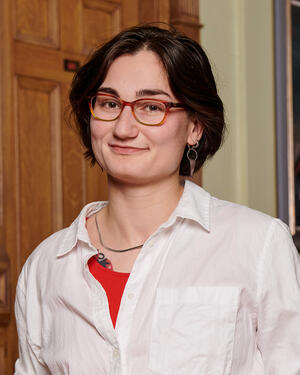
Rachel Katz is a fourth-year PhD student at the University of Toronto's Institute for the History and Philosophy of Science and Technology (IHPST) and a graduate fellow at the Schwartz Reisman Institute for Technology and Society. She mainly work in bioethics, along with philosophy of medicine and psychiatry. She has further research interests in areas in AI ethics and ethical issues in crowdfunding.

Lintao Dong is a third-year PhD candidate at the Institute for the History & Philosophy of Science & Technology (University of Toronto). His research interests are mainly found in the ethical and legal issues surrounding technology. He is currently working with Prof. Vold on technology and interference with individual choices.

Renée Andrea Sirbu Ph.D. student at IHPST. Renée received her B.Sc. in Human Biology, Bioethics, and Philosophy at UofT and her M.P.H. in Health Policy and Public Health Modeling from Yale, before spending two years as a predoctoral researcher at Yale's Digital Ethics Center. Her research explores the intersection of mortality and digital technology, focusing on human-computer interaction, brain-computer interfaces, and AI in clinical settings.

Hongyu Chen is currently pursuing a PhD at the IHPST. He researches philosophical questions surrounding the nature of mind and life, particularly where consciousness, embodiment, and agency are concerned. He is also interested in how developments in AI can help clarify the nature of cognition across diverse life forms and systems.
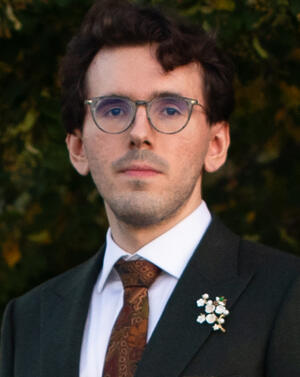
Kye Palider is pursuing his Ph.D. at IHPST. His research focuses on the history and philosophy of neural networks, especially as it intersects physics and neuroscience, and particularly through the lens of a connectionist science. He works as a research assistant on Prof. Vold's projects on epistemic uncertainty in AI systems, and the role of AI in scientific discovery.

Sabrina Singh is an undergraduate at the University of Toronto, double-majoring in Physics and Philosophy of Science. Her research explores neurotechnology advancement and its utility in addressing the widening gap between human capabilities and technological progress.
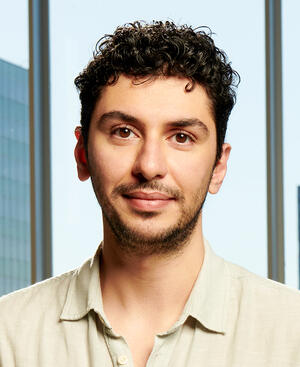
Pooyan Ehsani is currently pursuing a Master's degree at IHPST. His main areas of interest are AI ethics, ethical design, and the ethical implications of AI. With experience as a machine learning engineer, Pooyan aims to focus on the problem of human autonomy within AI systems.
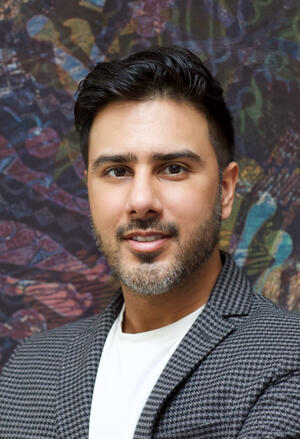
Ankesh Chandaria is pursuing his MPhil in AI Ethics and Society at the University of Cambridge. He also works as a strategy consultant, researcher, and lawyer qualified in the U.S. and U.K. with an LL.M. from UCLA. His interests include AI safety and governance, decision making, and the exploration of ethics and norms in the context of AI as a socio-technical whole.

Emily Huynh is a senior undergraduate at the University of Toronto, double majoring in Molecular Genetics & Microbiology and Cell & Molecular Biology. Her research focuses on practical, solution-oriented approaches to algorithmic bias.

Sofie Vlaad is a Ph.D. student in the Department of Philosophy at Queen's University, with with Prof. Catherine Stinson. Her research is firmly rooted in both feminist philosophy and transgender studies. These twin schools of thought inform her work in ways that are both explicit and implicit. Her current project brings together philosophy of AI, philosophy of creativity, and contemporary poetics to explore the relationship between art and AI.

Cheryl Lin is a senior undergraduate at the University of Toronto, majoring in computer science. Her interests are in long term challenges around advanced AI systems, including the potential for artificial general intelligence, and the technical and ethical challenges that these technologies will bring with them.
lab alumni

Jiamin Zhang is a PhD student at Shanxi University. She was a visiting student member of Periscope and the Institute of History and Philosophy of Science and Technology from 2024-25. Her main research interests are virtual reality technology, Philosophy of artificial intelligence and human enhancement technology.
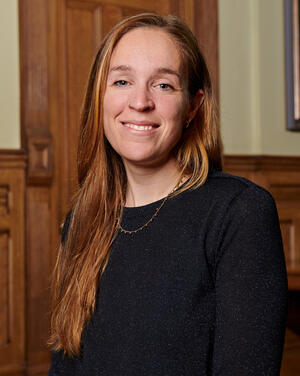
Dr. Jessie Hall is a postdoctoral researcher and course instructor at Carleton College. She was previously a postdoc at Periscope and the Schwartz Reisman Institute for Technology and Society. Dr. Hall received her BSc in physics and philosophy, focusing on the electromagnetism side of physics, and her Ph.D. on the metaphysics of computing at UofT.

Amelia Kush holds a BSc in Cognitive Science and Psychology and a MA in Philosophy of Science from UofT. She is currently pursing her Ph.D. in Philosophy at McGill University. Her main areas of interest are enactive/embodied cognition, consciousness, artificial intelligence, and the ethics of technology.

Dr. Xinyuan Liao is a former visiting member of Periscope (2022-23). She is now an Assistant Professor of Philosophy to Wuhan University. Dr. Liao works in philosophy of cognitive science, with particular expertise in extended cognition.

Helena Gagnier received her MA from the Institute for the History and Philosophy of Science and Technology. She is currently a strategy manager at the TELUS Data & Trust Office, focusing on the AI ethics and responsible AI development.

Xu Zhang is a former visiting member of Periscope (2025), completing her PhD at Southeast University. Her main research directions are privacy philosophy and technology philosophy. Her recent research interests include cognitive issues of digital privacy and privacy design issues in big data.
projects
AI safety and long term risks
As AI systems become more autonomous and more integrated into critical sectors like healthcare, finance, and security, concerns arise about unintended consequences, including catastrophic and existential risks. This project focuses on longer term ethical and safety risks that could emerge from future advanced AI systems. These include things like conscious AI systems, agentic systems, artificial general AI systems (AGI), as well as powerful narrow AI systems.
outputs> Tay, L., Vold, K. and A. Anderson. Training better humans with AI. (2025). Purdue University News. link ⇨> Staneva, M., Baret, A., Gobert, J., et al. (with Vold, K.). (2023). Assessing AI Capabilities with Education Tests. In Education Research and Innovation, AI and the Future of Skills: Methods and evaluation AI capabilities, Vol. 2. OECD. link ⇨> Vold, K. and D. Harris. How Does AI Pose an Existential Threat? (2021). Oxford Handbook on Digital Ethics, Oxford University Press, C. Veliz (Ed). link ⇨> Cave, S., Nyrup, R., Vold, K., and A. Weller. (2019). Motivations and Risks of Machine Ethics. Proceedings of the IEEE: Machine Ethics: the design and governance of ethical AI and autonomous systems. 107(3): 562-574. link ⇨> Shevlin, H., Vold, K., Crosby, M., and M. Halina. (2019). The Limits of Machine Intelligence. EMBO Report: e49177. link ⇨> Gómez, E. et al. (with Vold, K.). (2018). Assessing the impact of machine intelligence on human behaviour: an interdisciplinary endeavour. Proceedings of 1st Human Behaviour and Machine Intelligence Workshop, Barcelona, edited by the European Commission. link ⇨> Price, H. and K. Vold. (2018). Living With AI. Research Horizons, Issue 35. link ⇨
AI in medicine and healthcare
AI is becoming increasingly prevalent in healthcare due to the complexity and growing volume of health and medical data. It's already being used in areas like diagnosis, treatment recommendations, therapy, organ donation and allocation, and patient engagement. Each area of application presents its own unique challenges. This work explores a variety of opportunities and ethical risks around the use of AI in medicine and healthcare.
outputs> Vold, K., Orlandi, M., Hall, J., Huynh, E., Katz, R., and Gross, J. Ethical Considerations in using Artificial Intelligence in Organ Transplantation.
(Forthcoming). In the University of Toronto Press. Eds. M. Bhat and A. Sidhu.> Cossette-Lefebvre, H., Maclure, J., Vold, K., Facal, C., Avatars numériques post mortem et deuil: un point de vue éthique
(2025). Psychologie Québec, Vol. 42(3): 23-24. link ⇨> Crouch, M., Irvin, E., Tiong, M., Sriharan, A., Vold, K., Jetha, A. (2025). Artificial Intelligence in the workplace: A living systematic review protocol on worker health, safety, and well-being implications. Systematic Reviews Vol. 14(255): 1-9. link ⇨> Starke, G., Gille, F., Termine, A., et al. (with Vold. K.). Finding consensus on trust in AI in healthcare: recommendations from a panel of international experts" (2025). Journal of Medical Internet Research. link ⇨> Calvo, R., Deterding, S., Flick, C., Luetge, C., Powell, A., and Vold, K. (2023). "Editorial: After Covid-19: Crises and Socio-Technical Change", IEEE Transactions on Technology and Society. link ⇨> Vold, K. and J. Hernández-Orallo. AI Extenders and the Ethics of Mental Health. (2022). In Ethics of Artificial Intelligence in Brain and Mental Health, Springer's Advances in Neuroethics Book Series. link ⇨> Ahmadpour, N., Ludden, G., Peters, D., Vold, K. (2022). "Editorial: Responsible Digital Health" in Frontiers in Digital Health, Special Issue on Responsible Digital Health. link ⇨> McCoy, L., C. Brenna, S. Chen, K. Vold, and S. Das. (2021). Believing in Black Boxes: Must Machine Learning in Healthcare be Explainable to be Evidence-Based? Journal of Clinical Epidemiology. link ⇨> Peters, D., Vold, K., Robinson, D., and R. Calvo. Responsible AI – two frameworks for ethical design practice. IEEE Transactions: Technology & Society 1(1), 34–47. link ⇨
learning from machines
This project explores the epistemic opportunities of AI for human learning and knowledge discovery. The goal is to unlock the potential of AI-assisted discoveries—be them in science, medicine, or mathematics, for example—in ways that are sensitive to human epistemic capacities and limitations across a variety of contexts. This project draws on work from a range of fields including philosophy, psychology, history, and AI research.
outputs> Vold, K., (2026). Augmenting Military Decision Making with Artificial Intelligence. Cambridge Forum on AI: Law and Governance. link ⇨> Hall, J. and Vold, K., AI can uncover humanity’s unknown unknowns. (2025). IAI News. link ⇨> University of Toronto Magazine features an article on Dr. Vold's AI2050 Schmidt Sciences project on 'Learning from Machines.' link ⇨> Schmidt Sciences Foundation interviews Dr. Vold about her Project on 'Learning from Machines.' link ⇨
algorithmic bias in Canada
There is widespread evidence of biases emerging in various stages of AI system development: from training data, a lack of robust testing, proxy measure choices, system fine-tuning, etc. Despite this evidence, AI tools are being rapidly adopted by both industry and governments in Canada, making the delivery of services both unfair and highly inefficient for particular groups of people, especially racial, gender, ethnic, and linguistic minorities, and people of sovereign nations. The goal of this project is to build knowledge on how algorithmic bias is affecting minority groups and to suggest policies to mitigate these effects. Find out more on our project website: link ⇨
outputs> Clay-Gilmore, M. "Hunting for humans: on slavery, the emergence of the US as the world’s first super industrial state and its deployment of artificial intelligence and other military technology to repress dissent and neutralize enemy combatants. AI Ethics. link ⇨> Robinson, D. and K. Vold. (2018). Responsibly Deploying AI in the Immigration System. Policy Options. link ⇨
cognitive technologies
Cognitive technologies include emerging tools like virtual reality headsets, brain-computer interfaces, and other smart wearables that interact with or record brain activity. Also included are AI-driven tools and applications, such as classifiers, predictors, generative models that are designed to assist humans in completing cognitive tasks. These devices hold the potential to extend human cognition and improve our well-being, however, they also introduce new ethical dilemmas and philosophical concerns by challenging some of our traditionally held conceptual boundaries.
outputs> Vold, K., Hall, J., and A. Kush. The Hidden Risks of Neuralink. (2024). IAI News. link ⇨> Vold, K. and Liao, X. Neuroprosthetics, Extended Cognition, and the Problem of Ownership. (2024). With X. Liao. In Neuro-ProsthEthics – Ethical Implications of Applied Situated Cognition. Springer, B., Beck, O. Friedrich, and J. Heinrichs (Eds.):1-20. link ⇨> Vold, K. Human-AI Cognitive Teaming: Using AI to Support State-level Decision Making on the Resort to Force. (2024). Australian Journal of International Affairs 78 (2): 229-236. link ⇨> Schellaert, W., Burden, J., Vold, K. Martinez-Plumed, F., Casares, P., Loe, B. S., Reichart, R., Ó hÉigeartaigh, S., Korhonen, A. and J. Hernández-Orallo. (2023). Your Prompt is My Command: Assessing the Human-Centred Generality of Multi-Modal Models. Journal of AI Research, 77, pp. 377-389. link ⇨> Vold, K. Can Consciousness Extend? (2021). Philosophical Topics, 48(1), pp. 243-264. link ⇨> Vold, K. and D. Schlimm. (2020). Extended Mathematical Cognition: External representations with non-derived content. Synthese, 197(9), 3757-3777. link ⇨> Hernández-Orallo, J. and K. Vold. (2019). AI Extenders: The Ethical and Societal Implications of Humans Cognitively Extended by AI. Proceedings of the AAAI/ACM Conference in AI, Ethics, & Society. link ⇨
lab sponsors



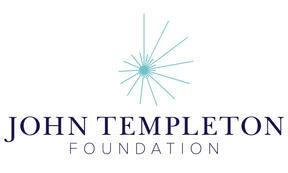









contact
We wish to acknowledge the land on which the University of Toronto operates. For thousands of years it has been the traditional land of the Huron-Wendat, the Seneca, and the Mississaugas of the Credit. Today, it is still the home to many Indigenous people from across Turtle Island and we are grateful to have the opportunity to convene our lab on this treasured land.
External
Dr. Karina Vold
IHPST
